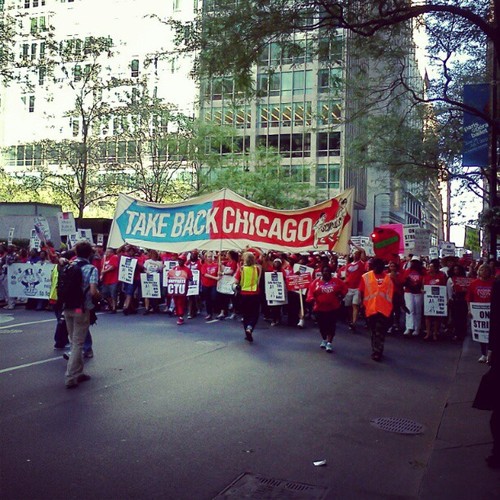Class and Identity Politics

In the end, all politics are identity politics. But politics is also about putting together winning coalitions. You can’t protect trans people if you don’t hold power, basically. Identity politics, as often expressed anyway, has an unfortunate tendency to highlight and celebrate difference rather than commonality. I have no problem with this, but it sure does make it hard to keep Donald Trump from holding office. So is there a way to express an identity politics that unites instead of divides? This is a conversation that a lot of labor folks want to have, because they tend to believe that class based politics can do this in a way that race or gender or sexual identity based politics cannot. I am sympathetic to this argument in theory, but am less convinced of it in practice.
Anyway, if you wanted someone to make this argument as strongly as possible, you’d perhaps ask Harold Meyerson to do so. And he just did this in the Prospect, noting that Trump is the ultimate identity politician:
You wouldn’t know it if you limited your reading to The Liberal Patriot, but the action these days in identity politics is all on the right. By importing white South Africans while expelling immigrants of color, by sacking the Black and female leaders of our armed forces while putting the Pentagon in the hands of a white nincompoop, by stripping the government’s archives of records of Black achievement and heroism while retaining the stories of pre-desegregation whites, Donald Trump has worked mightily to restore the white identity politics that was the norm in America before the 1960s.
To be sure, Trump couldn’t have won re-election last year by the votes of whites alone. He understood he needed to stoke and exploit the antipathies of a broader swath of voters. He accomplished that by incessant attacks on an amorphous cultural elite, attacks he’s escalated since taking office, as Harvard faculty and students can attest.
….
During these years, Democrats fell into identitarian mindsets and practices, too. The great egalitarian advances of the 1960s, after all, were undertaken precisely to include groups, predominantly Blacks, historically excluded from the promises of American democracy—the right to vote, to employment, to housing, to Social Security and the minimum wage, as well as to representation. The right concluded that entrusting the armed forces to a highly experienced Black man— Biden Defense Secretary Lloyd Austin—was the result of affirmative action run amok, while restoring it to a highly inexperienced white man—Trump Defense Secretary Pete Hegseth—marked a return to race-blind meritocracy. But decades of attacks on affirmative action paved the way for such Trumpian substitutions. Moreover, in the six decades since Wallace railed at the pointy-heads, those pointy-heads became major players in the nation’s center-left and left, and developed a distinct politics and mode of discourse that often accentuated the gap that had opened between them and a working class that was either stagnating or downwardly mobile.
Electorally, the Republicans’ white identitarianism, both abetted and mitigated by their attacks on cultural elites, enabled them to capture enough working-class votes to put Trump back in the White House and win both houses of Congress. The groups benefiting (both actually or supposedly) from the Democrats’ identity politics fell short of constituting an electoral majority, while the moderately populist economics the Democrats preached and sometimes practiced didn’t put them over the top, either. Despite its failure to deliver any tangible benefits, the Republicans’ one-two punch certainly resonated with angry and frustrated electors who understood that the economic prospects—i.e., the life prospects—they confronted were far more limited than those of their parents’ generation. Nothing that mainstream Democrats had on offer touched any of that anger, or even came close.
But for their current, and completely justifiable, anger at Trump, Democrats are simply not identified as the angry party. In the hundreds of focus groups that public opinion analyst Anat Shenker-Osorio has conducted with swing voters, she’s confirmed this view of the party’s identity. Besides asking directly about what words those voters associate with each party, she’s asked what animals they think of when the parties are brought to mind. For Republicans, those animals are lions, tigers, and sharks. For Democrats, they’re tortoises, slugs, and deer-in-the-headlights.
Ouch.
Whether the 99% rhetoric Meyerson calls for can work or not, I don’t know. I do tend to believe that big coalition politics does require focusing on majorities. But if you are on Bluesky, the only future for the Democratic Party is promoting ever smaller divides between people patrolled with ideological fervor. Seems like a loser to me. But then everything about Bluesky seems like a loser to me.


